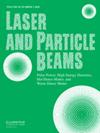高密度碳箔辐射烧蚀与加速的数值研究
IF 1.9
4区 物理与天体物理
Q4 PHYSICS, APPLIED
引用次数: 2
摘要
采用辐射流体动力学模拟方法研究了热x射线辐照下类金刚石高密度碳箔的烧蚀和加速过程。给出了辐射温度在100-300 eV范围内烧蚀波前的时间变化规律。在辐射温度为160 ~ 260 eV范围内,高密度碳的质量烧蚀率和烧蚀压力与已有的实验结果吻合较好。还发现烧蚀率的$T_{{\rm rad}}^3$标度定律不适用于260 eV以上的Trad。利用火箭模型,利用烧蚀锋面坐标,可以得到不同厚度目标的弹道和水动力效率,结果与仿真结果吻合较好。研究了不同箔片厚度和辐射温度下加速过程的峰值水动力效率。更高的辐射温度和目标厚度导致更高的流体动力效率。仿真结果对核聚变舱的设计具有指导意义。本文章由计算机程序翻译,如有差异,请以英文原文为准。
Numerical investigation of radiation ablation and acceleration of high-density carbon foils
The ablation and acceleration of diamond-like high-density carbon foils irradiated by thermal X-ray radiations are investigated with radiation hydrodynamics simulations. The time-dependent front of the ablation wave is given numerically for radiation temperatures in the range of 100–300 eV. The mass ablation rates and ablation pressures can be derived or implied from the coordinates of ablation fronts, which agree well with reported experiment results of high-density carbon with radiation temperatures Trad in the range of 160–260 eV. It is also found that the $T_{{\rm rad}}^3$ scaling law for ablation rates does not apply to Trad above 260 eV. The trajectories of targets and hydrodynamic efficiencies for different target thicknesses can be derived from the coordinates of ablation fronts using a rocket model and the results agree well with simulations. The peak hydrodynamic efficiencies of the acceleration process are investigated for different foil thicknesses and radiation temperatures. Higher radiation temperatures and target thicknesses result in higher hydrodynamic efficiencies. The simulation results are useful for the design of fusion capsules.
求助全文
通过发布文献求助,成功后即可免费获取论文全文。
去求助
来源期刊

Laser and Particle Beams
PHYSICS, APPLIED-
CiteScore
1.90
自引率
11.10%
发文量
25
审稿时长
1 months
期刊介绍:
Laser and Particle Beams is an international journal which deals with basic physics issues of intense laser and particle beams, and the interaction of these beams with matter. Research on pulse power technology associated with beam generation is also of strong interest. Subjects covered include the physics of high energy densities; non-LTE phenomena; hot dense matter and related atomic, plasma and hydrodynamic physics and astrophysics; intense sources of coherent radiation; high current particle accelerators; beam-wave interaction; and pulsed power technology.
 求助内容:
求助内容: 应助结果提醒方式:
应助结果提醒方式:


